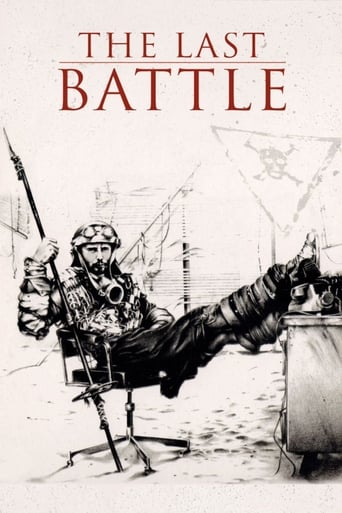Jackson Booth-Millard
This was the debut film from director Luc Besson (Léon, The Fifth Element), this film featured in the 1001 Movies You Must See Before You Die book was a different kind of French film, I didn't have to worry about subtitles, because I had no idea it was completely mute. Basically in an unspecified point in the future, the world has become a post-apocalyptic wasteland, and only a few humans have survived whatever the disaster was, and none of them are able to speak or communicate verbally, most likely due to some kind of gas or radiation exposure destroying their vocal cords. Using physical movements and expressions only to communicate, all those who are left alive from the devastation of civilisation are fighting for survival, trying to find food and most fending for themselves, living in isolation, and the only way they can get by is through using brutality and hostility. The main character is known only as The Man (Pierre Jolivet) who is battling against the vicious character known only as The Brute (Jean Reno, in his feature debut), using improvised weapons and armour made from parts in the wreckage and their own remaining physical strength, they are only two of a few people left, and practically all are against each other. Also starring Jean Bouise as The Doctor, Fritz Wepper as Captain, Christiane Krüger as Captain's Concubine, Maurice Lamy as Dwarf, Michel Doset as Captain's Man, Pierre Carrive as Captain's Man and Bernard Havet as Captain's Man. The acting is obviously crucial to what is going on, because the film has absolutely no dialogue, only a little grunting and stuff, in his first acting role Reno proves himself a terrific villainous character, there obviously isn't any plot, it is just literally the last few humans on Earth fighting each other to survive and get whatever resources they can, an interesting poetic and cataclysmic science-fiction film. Very good!
Rooster99
I am glad that Luc Besson moved on from this Cannes film festival fodder and into more entertaining movies. Although it does take a fair amount of gall to direct a post-apocalyptic film in black and white with absolutely no dialogue, it seemed obvious to me that it was geared for the Film Festival set; things happen incredibly slowly, and there is no explanation for many elements of the film (people can't talk, fish rain from the sky, etc.), but how could there be as there is no dialogue? If you absolutely must see everything Luc Besson has directed, then by all means, see this movie. But if you are looking for a well-made Besson, then search somewhere else. Luc Besson has directed such classics as Nikita, Leon, Subway, and Le Grand Bleu, all of which are infinitely more entertaining and watchable than this post-modernistic French cinema which was likely praised at the time of its release as the future of film. Fortunately, it wasn't, and Besson went on to bigger and better things.
Baroque
Not exactly. This is a most unusual film. Shot in widescreen and black and white, with Dolby stereo and only one whispered bit of dialogue. The world is in ruins, and our main character (credited as "The Man"), makes his escape from a band of looters by stealing their prized possession, a fully charged automobile battery, and uses it to power his ultra-light plane out of the ruins of the city.In his travels, he comes across a doctor, with whom he communicates non-verbally (apparently, the atmosphere is so polluted, the human race is rendered mute), and confronts another man, a clumsy, self-styled "barbarian of the wastelands" who wields a sword as if it were a broom.One of Luc Besson's early works, it is as original as it is imaginative. I had the fortune of seeing it on a wide motion picture screen in New York City. I still haven't forgotten it. Yes, I know that the end of the world makes for a strange concept for an art film from France, but Besson makes this unlikely premise work to perfection.Highly recommended.
Foopy-2
Well, I guess I was in the mood for a movie that really grabbed me from the beginning. This movie wasn't it. It plodded along at a pretty slow, deliberate pace for the first 40 minutes, but there wasn't really anything in it that I was terribly interested in--there's an intriguing and mysterious feud between Jean Reno's character and an old man, but more of the first 40 minutes is dominated by the wanderings of the main character, whom I didn't know much about and couldn't really relate to at the time. He wanders around alone for the most part, he doesn't meet anyone; I imagine the director was trying to depict the loneliness of the human condition in this post-apocalyptic world or something, which is all good, but I still wish he'd trimmed it down from 40 minutes to 15, because it can get incredibly boring.But after those 40 minutes, things start to get very interesting. I guess I won't really say more than that because I don't want to spoil anything. So if you've seen the first 15-30 minutes of this movie and are thinking about turning it off (like I was), just stick with it--it gets a lot better.One of the most interesting things I found about this movie was the fact that it had no dialogue whatsoever, which really made me have to think about what was happening, how characters were feeling and what their motivations were, why things were how they were in this post-apocalyptic world, all of which gives the story a lot of room for audience interpretation. And it's amazing how much more satisfying a movie is when the actors aren't telling you exactly what's going on.



